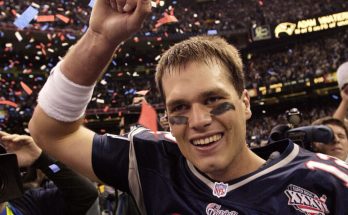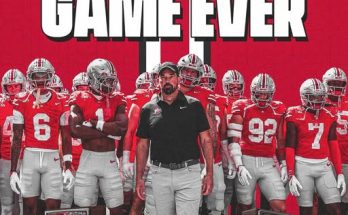Madison Square Garden Erupts with Excitement as Rangers Icon Brian Leetch Returns as Senior Coach.
The echoes of the past roared back to life inside Madison Square Garden as Brian Leetch, one of the most iconic figures in New York Rangers history, made his triumphant return to the franchise—not as a player this time, but as a senior coach. For fans who remember his legendary career on the blue line, the announcement sparked not just nostalgia but a resurgence of hope. The Garden hasn’t buzzed with this kind of energy in years, and for good reason. Brian Leetch returning to the Rangers represents more than just a hiring. It’s a spiritual homecoming.
Leetch’s return immediately drew passionate responses from fans across New York and beyond. Social media exploded with tributes, old highlight clips, and heartfelt messages from longtime supporters. For the younger generation who didn’t see him play live, this was a history lesson unfolding in real-time. And for those who did watch him skate night after night, it was like witnessing a piece of their youth step back onto the ice in a different role, ready to guide a new era of Rangers hockey.
What makes this story even more remarkable is that Leetch has always symbolized everything the Rangers organization stands for: class, grit, leadership, and loyalty. Drafted by the Rangers in the first round in 1986, Leetch spent the majority of his Hall of Fame career donning the red, white, and blue jersey. He became the face of the franchise during the 1990s, culminating in the unforgettable 1994 Stanley Cup championship—the first for the team in 54 years. His performance in those playoffs, where he became the first American-born player to win the Conn Smythe Trophy as playoff MVP, etched his name forever into New York sports lore.
Bringing Leetch back now, especially in a coaching capacity, is more than symbolic. The team is currently in a transitional period, hovering between being a young, developing squad and a team capable of making a deep playoff push. Leetch’s presence provides not just veteran wisdom, but the kind of credibility and institutional knowledge that simply cannot be taught. He lived the Rangers crest. He bled for it. And now he’ll teach others to do the same.
Players like Adam Fox—an elite defenseman himself and a Norris Trophy winner—will likely benefit enormously from having Leetch around. The parallels between Fox and a young Leetch are uncanny: smooth skating, high hockey IQ, poise under pressure, and a knack for contributing offensively without sacrificing defensive responsibilities. Having a mentor who quite literally wrote the blueprint for that style of play could take Fox’s already high-level game to even greater heights.
Leetch won’t be coming into this role blind, either. Since his retirement in 2006, he’s stayed closely involved in hockey circles, often serving in advisory and developmental capacities for USA Hockey and occasionally consulting with NHL organizations. But the Rangers always remained close to his heart, and this role brings him fully back into the fold in a more hands-on, day-to-day way.
According to team executives, the move has been months in the making. There were discussions, quiet meetings, and reflections on timing and fit. But ultimately, both sides agreed that now was the perfect moment. The Rangers are brimming with promising young talent—names like K’Andre Miller, Braden Schneider, and Zac Jones on the blue line—and these players can now learn directly from a man who has mastered the position. In today’s NHL, where the game is faster and more dynamic than ever, having a coach who understands both the classical and modern elements of defensive play is invaluable.
Leetch’s humility, a trademark of his entire career, was front and center during his introductory press conference. “This building has always felt like home,” he said. “To be back here, in this capacity, helping the next generation of Rangers understand what it means to wear this jersey—it’s something I’m honored to do.” He deflected praise, focusing instead on the team’s potential and the work ahead. But make no mistake: his presence alone is a statement.
The players certainly took notice. Several current Rangers veterans, including Chris Kreider and Mika Zibanejad, reportedly expressed their excitement about working alongside Leetch. They know what he represents. He’s a living link to a championship past and, potentially, a bridge to a title-contending future. His calm demeanor, analytical mind, and proven pedigree could provide the spark the locker room needs during those tense stretches of the season when coaching influence matters most.
From a fan perspective, the emotional weight of this announcement cannot be overstated. For generations of Rangers supporters who waited decades to see the team hoist the Stanley Cup, Brian Leetch is more than a hockey player—he’s a hero. His return to the team stirred up all those deeply held memories: the Game 7 victory over the Canucks, the parades down the Canyon of Heroes, the unforgettable call from Sam Rosen as Leetch led the rush. It brought back a golden era, and for a fan base that’s always worn its heart on its sleeve, this was a moment of celebration that went far beyond the scoreboard.
The Rangers organization also understands the marketing and morale boost Leetch’s presence brings. Merchandise with his name began flying off shelves again, even though he hasn’t played in nearly two decades. Ticket sales spiked overnight, and fan forums were filled with plans to create tribute banners and Leetch-themed nights at the Garden. It’s a rare thing when a personnel move can simultaneously excite fans, enhance the roster, and uplift the franchise’s image—but this one checked all the boxes.
Yet, perhaps the most important impact Leetch will have is in setting a tone. This is a man who never took shortcuts, who studied the game meticulously, and who led by example every shift. That kind of ethos can seep into a team’s culture if modeled from the top. It’s not about just teaching systems or tactics—it’s about instilling the kind of commitment and accountability that wins championships.
Leetch’s return also sends a message to the league. The Rangers are serious about reconnecting with their identity. They’re not just building for the future; they’re building on their past. By embracing their legends, they’re creating a stronger foundation. Other franchises have done this with great success—Steve Yzerman in Detroit, Joe Sakic in Colorado—and now the Rangers have taken a step in that same direction. The hope is that it pays similar dividends.
Of course, coaching in the NHL, even in a senior capacity, isn’t a guaranteed success. It will come with challenges—navigating egos, adjusting strategies mid-season, and helping the team respond to adversity. But if there’s anyone equipped for that role, it’s Brian Leetch. He’s already proven he can lead in the toughest environments, under the brightest lights, and with the highest expectations. The only difference now is he’ll be doing it in a suit instead of skates.
The storyline is almost poetic. One of the greatest players in Rangers history returns to the very place where he made his name, not to chase personal glory, but to help others achieve what he once did. It’s a full-circle moment that reaffirms the franchise’s commitment to excellence, loyalty, and legacy. Madison Square Garden has always been a venue where legends are born. Now, it has welcomed one of its own back—this time behind the bench.
For fans, it’s more than just strategy or Xs and Os. It’s about belief. The belief that someone who understands what it takes to win in New York is now in a position to guide the next group of players to do the same. It’s about reconnecting with the soul of the franchise, and about writing the next chapter in a story that began long ago.
Brian Leetch never asked for the spotlight, but it has a way of finding him. And now, under the lights of the Garden once more, he stands ready—not as a player chasing a puck, but as a coach shaping a legacy. The excitement that erupted at Madison Square Garden was not just a reaction to a hiring—it was a recognition that sometimes, the past has a way of coming back exactly when it’s needed most.



